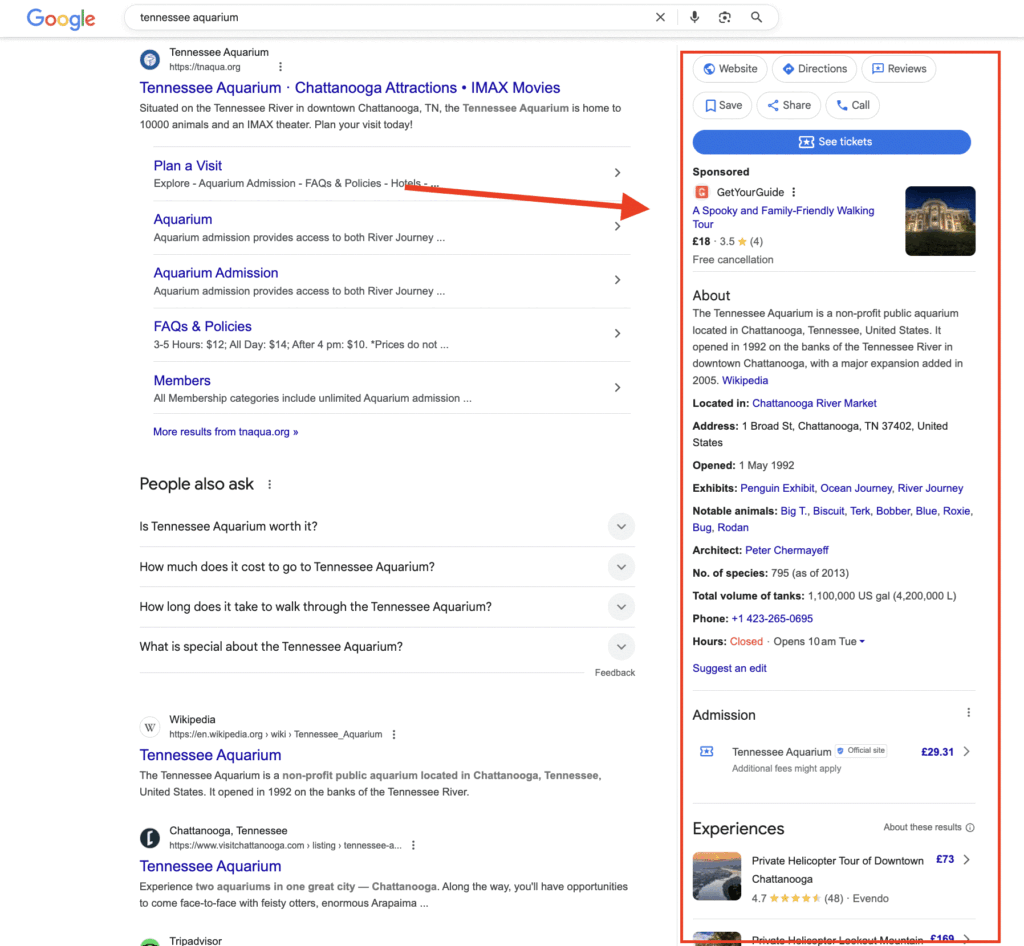Entity SEO: Building Your Brand’s Knowledge Graph
Key Takeaways
- Entity SEO helps search engines understand your business as a distinct entity, leading to more accurate and consistent information in search results.
- By employing consistent entity signals like schema markup and social profiles, you can have more control over your brand information displayed by Google, reducing the risk of outdated or conflicting details.
- Entity SEO goes beyond traditional SEO by focusing on structuring your online presence to present your business as a unified entity, improving how Google represents your brand in search results.
Looking to get a Knowledge Panel for your business? Want to ensure Google shows the right information when people search for your name?
Enter entity SEO.
Google search results are shaped by more than just keywords. They increasingly draw on the Knowledge Graph—Google’s system for identifying, categorizing, and connecting real-world entities like businesses, people, and organizations.
Entity SEO is the process of helping your business become part of that system. It’s how you ensure Google understands who you are, what you do, and how to represent your brand in search.
In this post, we’ll walk you through the essentials of entity SEO: what it is, why it matters, and how to structure your online presence so Google can recognize and represent your brand more accurately in search.
Let’s dive in.
What Is Entity SEO?
Entity SEO is the practice of helping search engines understand your business as a clearly defined entity—not just a set of web pages.
When Google can confidently identify your business as a distinct entity, it’s better able to surface accurate, consistent information about you in search results.
While traditional SEO focuses on optimizing individual pages through keywords, content, links, and technical signals, entity SEO looks at the bigger picture. It’s about describing your business in a structured way across your site and the wider web so Google can treat it as one unified entity.
Why Entity SEO Matters
Helping Google understand your business as an entity isn’t just a technical checkbox. It influences how your brand is discovered, evaluated, and presented in search.
Here are the core benefits:
More Control Over Your Brand Information
Consistent entity signals—such as schema markup, social profiles, and trusted third-party mentions—help Google understand the key facts about your business, including your name, logo, description, and services. This reduces the chances of outdated or conflicting details appearing in search results.
Eligibility for Enhanced Search Features
When your business is clearly recognized as an entity, you’re more likely to qualify for features like Knowledge Panels, sitelinks, and AI-generated summaries. These formats increase your search visibility and can build instant credibility with users.
Stronger Fit with How Google Understands Content
Google increasingly relies on semantic relationships to understand what content best answers a given query. Entity SEO helps your business fit that model by making it easier for Google to understand who you are, connect your brand to related topics, and surface more relevant results to users.
How to Build a Search-Ready Entity
If you want your business to be recognized as an entity in Google’s Knowledge Graph, you need to send clear, consistent signals across your site and the wider web.
These five steps will help you build a solid foundation for entity recognition and long-term visibility in search.
1. Align On-Page Schema with Key Identity Signals
Your website should act as the primary source of truth about your business. Schema markup helps reinforce that by giving Google a structured, machine-readable version of the key facts on your site.
Start by adding Organization or LocalBusiness schema to your homepage or about page. Use Organization if your business operates nationally or online only. Use LocalBusiness if you serve a specific geographic area or have a physical location.
These pages typically give the clearest overview of your business and are often treated by Google as the central reference point for understanding your brand.
This schema should include fields such as:
- Business name
- Logo
- Website URL
- Description
- Founders or key personnel
- Social profiles (using the sameAs property)
- Address and contact details, if applicable
- A unique @id URL to define the entity (often your homepage)
Keep this information accurate, concise, and fully aligned with what’s visible on the page. Schema isn’t a magic shortcut. It works best when it reinforces what users (and search engines) already see. Be sure to use JSON-LD format, which is Google’s preferred way to implement structured data.
You can use Google’s Rich Results Test to check for errors and make sure your markup is valid.
2. Create or Improve Your Wikidata Entry
Wikidata is one of the most direct pathways into Google’s Knowledge Graph. Even if you don’t have a Wikipedia article, a well-structured Wikidata entry can help establish your business as a recognized entity.
If your business already has a Wikidata item, start by reviewing it for accuracy and completeness. If not, you can create one—but be aware that Wikidata has notability guidelines and prefers entries supported by reliable, third-party sources (not just your own website).
Your Wikidata item should include key facts such as:
- Business name
- Official website (with the P856 property)
- Instance of “organization” or relevant subclass
- Industry or business type
- Location or headquarters
- Social media profiles (with properties like P2002 for Twitter/X, P2013 for Facebook)
- Descriptions in multiple languages, if applicable
Cite independent sources wherever possible—such as press mentions, business directories, or company profiles on trusted platforms. The more verifiable and cross-referenced your entry is, the more likely it is to be retained and factored into the Knowledge Graph.
Once your Wikidata item is live, add its URL to your website’s schema using the sameAs property. This helps Google connect the dots between your site and your official entity profile.
3. Earn Mentions from Authoritative Third-Party Sources
Google doesn’t rely solely on your website to understand your business. It also crawls other trusted sources across the web to find and confirm key facts about you. These third-party mentions help reinforce the signals you’ve already established through schema and Wikidata.
This isn’t link building in the traditional sense. You’re not aiming for backlinks from high-authority domains to boost rankings. What matters here is whether your business is described in a clear, verifiable way—using the same name, description, and basic details you’ve published elsewhere.
Mentions on trusted platforms can carry real weight. That might include local business directories, trade associations, LinkedIn company pages, or features in industry blogs or local press. Even a podcast bio or guest article can help—so long as the information aligns with what’s on your site and in your structured data.
If the details are inconsistent or out of date, it becomes harder for Google to recognize and connect your brand.
4. Claim and Optimize Your Google Business Profile
If your business serves a specific geographic area or has a physical location, claiming and optimizing your Google Business Profile (GBP) is essential for strengthening your entity signals.
A well-maintained GBP helps Google verify key details—such as your name, location, website, and services—and improves how you’re displayed in both local and branded search results.
Make sure your profile:
- Uses your official business name (matching your website and structured data)
- Links to your canonical homepage
- Includes accurate categories—especially the primary category, which strongly affects classification
- Lists your services, contact details, and business hours
- Features a verified address (if applicable)
- Is regularly updated with photos, posts, and responses to reviews
You should also add your GBP URL to your Organization or LocalBusiness schema using the sameAs property. This helps Google connect your profile with your broader online presence.
Further reading: Tips to Rank Your Google Business Profile
5. Secure a Google Knowledge Panel (and Suggest Edits)
A Google Knowledge Panel is one of the clearest signs that your business is recognized as a distinct entity. While you can’t request one directly, following the steps above significantly increases your chances of triggering one.
Panels are generated automatically when Google has enough reliable information to confidently define and represent your brand.
They look like this:

If a panel does appear for your business, you can claim it by clicking “Claim this knowledge panel” and completing the verification process (typically using a Google account connected to your website, Google Business Profile, or social profiles). This gives you the ability to suggest factual updates—like correcting your logo, description, or social profiles.
If you don’t see a panel yet, keep reinforcing the signals covered in this post. Over time, they help Google build enough confidence to display one.
Final Thoughts
Entity SEO is how you help Google understand who you are and represent your brand accurately across search.
By aligning your schema, Wikidata presence, third-party mentions, and business profiles, you’ll create a consistent identity Google can trust.
Put the steps into practice and you’ll give Google the confidence it needs to showcase your business clearly, credibly, and more often in search.
